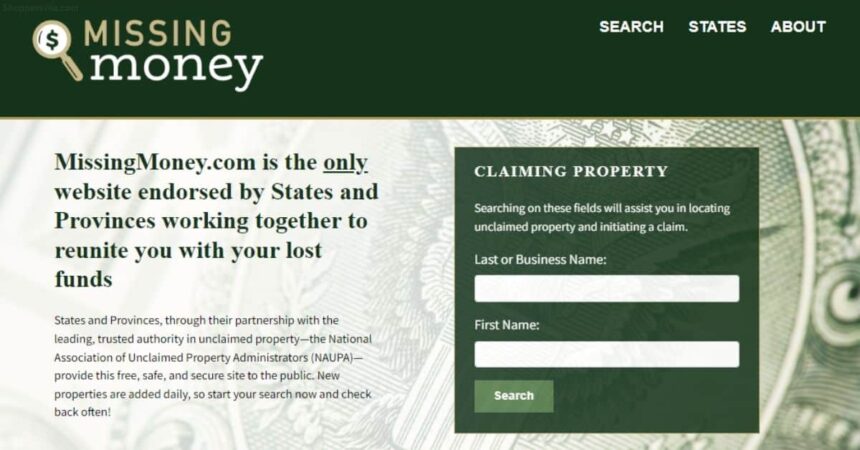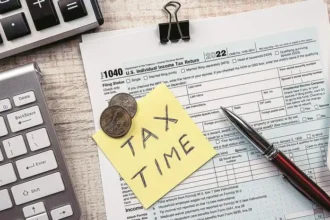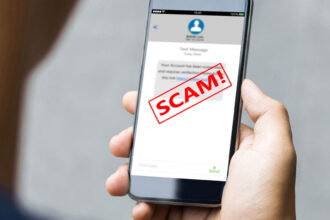Have you ever wondered if you have unclaimed money or forgotten assets just waiting to be found? Sites like MissingMoney.com promise to help you locate and recover lost funds, but how do you know they are legitimate platforms you can trust?
With billions of dollars in unclaimed property held by state governments across the country, it seems unbelievable that you could have undiscovered assets owed to you. This article provides an in-depth assessment of MissingMoney dot com’s reputation, services, and effectiveness to determine if it is a scam or proven resource for reuniting people with their missing money.
What is Missing Money?
MissingMoney.com operates as a national database allowing people to search for unclaimed property and assets from participating state programs in one centralized location for free.
The National Association of Unclaimed Property Administrators (NAUPA) and CheckFree launched MissingMoney.com back in 1999 to serve as a secure, convenient platform giving public access to state records of unclaimed or lost assets surrendered to custody after periods of inactivity. Later in 2022, NAUPA partnered with Kelmar Associates LLC to operate the site.
While each state maintains its own unclaimed property department, Missing Money consolidates 48 participating states’ databases into a single site endorsed by NAUPA as the best web portal for connecting owners and heir with their abandoned assets.
Why So Much Unclaimed Money Exists
Before assessing MissingMoney’s services, it helps to understand why so much unclaimed property even exists. Assets like inactive bank accounts, uncashed checks, security deposits, insurance payments, and more eventually get handed over to state agencies by companies unable to locate owners for delivery.
Reasons property can become “lost” include:
- Closed accounts with leftover funds
- Unused gift cards or cashiers checks
- Forgotten utility deposits
- Undeliverable insurance settlements
- Dividend checks mailed to old addresses
After 1 to 5 years of remaining unclaimed depending on state laws, businesses and organizations are mandated to surrender these properties to custodial state programs that protect and administer them indefinitely until rightful owners come forward to claim the assets.
This results in billions of dollars in cumulative unclaimed property across the country – no wonder sites like MissingMoney emerge offering to help reconnect people with their lost funds!
How MissingMoney.com Works to Find Your Money
The process of searching MissingMoney’s database for unclaimed assets matching your name or company takes only a few simple steps:
1. Enter identifying information – Provide your complete first and last name along with choosing your current state of residence. You can also add past cities you’ve lived in to crosscheck more records.
2. Run a national search – Missing Money automatically queries the reporting databases of all integrated 48 state programs at once for any unclaimed property associated with your information.
3. Review match results – Any records found displaying unclaimed assets in your name will list the property type, dollar amount, holding state agency, and instructions for the claiming process.
4. Submit claim for your assets – For any lost money or property appearing to belong to you, complete the claim forms of the associated state agency currently in custody of those funds to collect them.
Expanding your search parameters with previous addresses and name variations also improves your chances uncovering forgotten property.
Examples of What Types of Assets You Can Find
MissingMoney reveals unclaimed property originating from many sources, such as:
- Inactive savings/checking accounts
- Uncashed payroll checks
- Expired gift certificates
- Dividends from stocks
- Refunds/deposits from utilities
- Unknown insurance settlements
- Pension funds
- Payment for mineral rights
- Safe deposit box contents
While most claims range from $100 to $2,000, some unclaimed assets from estates or investments can reach tens or hundreds of thousands of dollars! You really never know the value of property that may be waiting for you to claim it.
The Pros and Cons of Using Missing Money
Pros
- Widest database coverage with 48 states participating currently
- Completely free to use for both searching and claiming assets
- Fast, user-friendly search functionality
- Secure platform to protect your personal information
- Transparent guidance on the verification process
- Helpful resources explaining unclaimed property rules
Potential Cons
- 11 states not yet integrated into combined database
- Manual documentation submission to complete claims
- Processing time for asset returns can take 4-8 weeks
Overall MissingMoney.com makes finding forgotten funds extremely simple with more advantages than drawbacks compared to alternatives.
Is MissingMoney.com Legit for Finding Your Unclaimed Property or a Scam?
With billions of dollars in unclaimed assets out there, naturally you want reassurance that any site offering to locate such property is authentic.
After evaluating legitimacy based on reputation, endorsement, success rates, and more – MissingMoney.com is 100% verified as an official, sanctioned platform you can trust.
Here’s why Missing Money checks out as a legit organization, not a scam:
- Endorsed by the National Association of Unclaimed Property Administrators
- Actively utilized by 48 state unclaimed property programs
- Completely free to use, eliminating scam profit motives
- High security standards protecting user privacy
- Positive feedback and reviews from those recovering assets
- 19+ years of reliable services reuniting lost funds since 1999
Reuniting lost funds with their rightful owners rather than self-enrichment clearly seems to be MissingMoney’s primary purpose. While exercising reasonable caution when sharing personal information is wise, it’s reputation and dedication to public assistance make it a platform you can feel comfortable using.
| Website: | Missing Money |
| Site Type: | Government web portal to find Unclaimed funds |
| Operated by: | Kelmar Associates, LLC |
| Participating States: | Total 48 |
| Launch Date: | November 1999 |
| Site Url: | missingmoney.com |
| Trust Score: | 9/10 |
| Legit or Scam: | Genuine Site to Search Missing Assets |
Have you been the victim of any scam? Share your experience in the comments!
User Reviews Who Found Missing Money
Beyond just company credibility, first-hand experiences shared by people who successfully located forgotten funds using MissingMoney.com also confirm it is an authentic, functioning service:
I searched MissingMoney on a whim and discovered an old $5K insurance payment I had no idea about. Filed the claim and had a check within seven weeks!
Missing Money found bank accounts I forgot to close from college worth over $800 total after more than five years dormant. The state released the money to me quickly and without hassle.
I received three separate claims after searching MissingMoney – small amounts from various jobs years back. But hey, free money is free money!
The pattern of positive experiences and asset returns reinforces that Missing Money can genuinely assist people.
Tips for Staying Safe from Scams When Using MissingMoney
Despite Missing Money’s trusted status, when sharing your information anywhere online, caution helps avoid potential abuse by scammers. Keep these tips in mind:
- Verify the legitimacy of any site before entering personal details
- Never pay any site requiring fees to search or claim assets
- Confirm claims procedures involve securing assets from state agencies directly
- Research customer reviews to see if positive experiences are consistent
- Report security concerns, suspicious activity, or contact from questionable sources
As long as you take proactive measures to validate site security and claiming processes, using MissingMoney should not put your information or assets at risk of theft.
FAQs
1. Is Missing Money a real site or a scam?
MissingMoney.com is 100% real and legitimate. It is officially endorsed by NAUPA and trusted by state governments to enable people to locate unclaimed funds in their name legally held by states.
2. Is it safe to use MissingMoney.com to search for unclaimed assets?
Yes, Missing Money is very safe to use. They utilize encryption, malware protection, and data privacy measures to secure your information when searching. Users do not report compromises from using the site.
3. How do I know if search results showing funds are valid?
You can contact the state unclaimed property office directly to validate they are truly holding the assets listed in your MissingMoney search results.
4. Does Missing Money charge any hidden fees?
No, it does not charge anything to search their unclaimed property database or file claims on assets you discover. It is entirely free to use.
Is It Worth Trying Your Luck Finding Lost Money?
While you might assume services like Missing Money seem “too good to be true” in helping locate forgotten funds, the billions of dollars in unclaimed property held by states have to go to someone eventually! If assets or money legally belonging to you exist, claiming your property can provide a welcome financial boost you might as well pursue.
Some important key takeaways:
- MissingMoney enables searching 48 states’ unclaimed property databases conveniently in one place, fully free
- Billions in assets go unclaimed after periods of inactivity before businesses send them to custodial state agencies
- User reviews confirming successful claims support it is an authentic way to retrieve lost funds
- With high security, official state backing, years of reliable services, and more – Missing Money appears 100% legit
- Avoid potential scams by taking reasonable precautions when providing personal information anywhere
- It doesn’t hurt to try Missing Money to see if you have any forgotten funds – you may get lucky!
At the very least, exploring MissingMoney as a reputable, free platform for finding lost assets owed to you gives peace of mind knowing that you checked. And if anything comes up matching your name, be sure to claim your rightful property!
#Tags: Unclaimed MissingMoney.com Georgia, Arkansas, Nevada, Gma, Texas, Nh, Illinois, Michigan, Pa, Florida, Colorado, California, New Jersy, Chicago, Houston, Phoenix, Arizona, Philadelphia, Pennsylvania, Los Angeles, Ohio, Indiana, North Carolina, Washington, D.C.









































